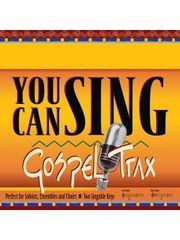CD You can sing- Gospel Trax Center of my joy -
The story of Richard Smallwood reads like the script to a great movie. It's a struggle for survival, leading to success beyond his wildest imaginings, set against the long odds of poverty and discrimination that were just a routine part of everyday life for most African-American families in the "Old South." The cast of characters includes parents of often diametrically different dispositions: a stern taskmaster/pastor father, and a mother of a gentler, artistic disposition; and a little boy born into the world with prodigious gifts as well as a profound loneliness.
The scene could open with a baby in his crib, humming melodies to hymns before he'd even learned to articulate a word to go with them; and later, as a youngster in his robe, standing before a mirror, "conducting" a choir of Christmas tree ornament angels, to whatever music was playing on the radio at the time. Then, as a young man at Washington, D.C.'s renowned Howard University, living a life immersed in both the great classical music of the last several centuries, and the campus radicalism of the late-'60s that raised a loud and proud voice, that would not be silenced, demanding that studies of African and black American history, music and all art forms be included in the school's curriculum.
